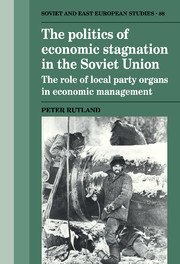 The Politics of Economic Stagnation in the Soviet Union
The Politics of Economic Stagnation in the Soviet Union Book contents
- Frontmatter
- Contents
- List of tables
- Preface
- Glossary of Russian terms and abbreviation
- Introduction: The party in the post-totalitarian system
- 1 The party and the economy: structures and principles
- 2 Party interventions in industry
- 3 Interventions in industry: case studies
- 4 The party as regional coordinator
- 5 Regional coordination: case studies
- 6 The party as fireman: party interventions in the transport and energy sectors
- 7 The role of the party in agriculture
- 8 Non-party control organs
- 9 The principles underlying the party's work with cadres
- 10 The obkom elite in the 1980s
- 11 Party and economy under perestroika
- Conclusion Party and economy in the USSR: from stagnation to collapse
- Appendices
- Notes
- Bibliography
- Index
- THE POLITICS OF ECONOMIC STAGNATION IN THE SOVIET UNION
9 - The principles underlying the party's work with cadres
Published online by Cambridge University Press: 06 July 2010
- Frontmatter
- Contents
- List of tables
- Preface
- Glossary of Russian terms and abbreviation
- Introduction: The party in the post-totalitarian system
- 1 The party and the economy: structures and principles
- 2 Party interventions in industry
- 3 Interventions in industry: case studies
- 4 The party as regional coordinator
- 5 Regional coordination: case studies
- 6 The party as fireman: party interventions in the transport and energy sectors
- 7 The role of the party in agriculture
- 8 Non-party control organs
- 9 The principles underlying the party's work with cadres
- 10 The obkom elite in the 1980s
- 11 Party and economy under perestroika
- Conclusion Party and economy in the USSR: from stagnation to collapse
- Appendices
- Notes
- Bibliography
- Index
- THE POLITICS OF ECONOMIC STAGNATION IN THE SOVIET UNION
Summary
As explained in chapter 1, the party attached great importance to its role in the selection, training and promotion of cadres in non-party organizations. The theory was that rather than have party officials supervise industry directly, party influence should operate indirectly, via the line managers.
Conservative party thinkers in the Brezhnev period still subscribed to Stalin's philosophy of ‘cadres decide everything’, arguing that the system's institutional structure was fundamentally sound, and merely needed an infusion of fresh blood to make it function to its full potential.
In published descriptions of party activity in the economy, there was much more convincing detail on their role in cadre selection than for any other aspect of their economic work. For example, directors writing articles in Ekonomicheskaia gazeta rarely referred to the activities of party officials in their factory, but when they did it was often in connection with cadre selection.
Chapter 1 described the mechanics of party work with cadres: the nomenklatura system, its role in the removal of incompetent or corrupt officials and so forth. This chapter looks at some of the principles underlying this process. What was the party looking for in the cadres it promoted? Was there tension between the demands of political loyalty and technical competence?
The Soviet image of the ideal manager
There was a considerable body of sociological literature in the USSR spelling out the ideal combination of qualities which a Soviet manager should display.
- Type
- Chapter
- Information
- The Politics of Economic Stagnation in the Soviet UnionThe Role of Local Party Organs in Economic Management, pp. 175 - 187Publisher: Cambridge University PressPrint publication year: 1992


